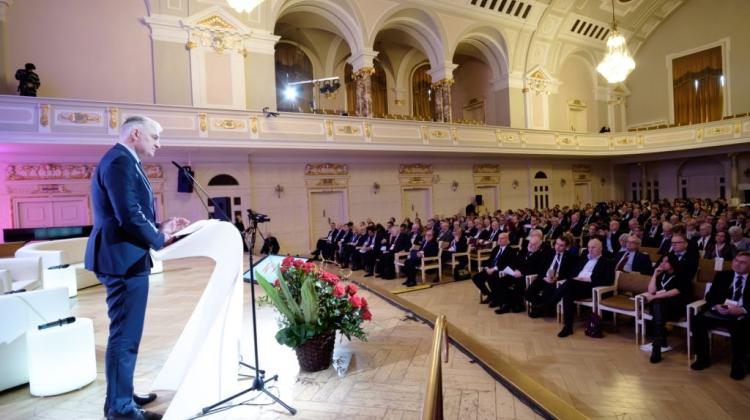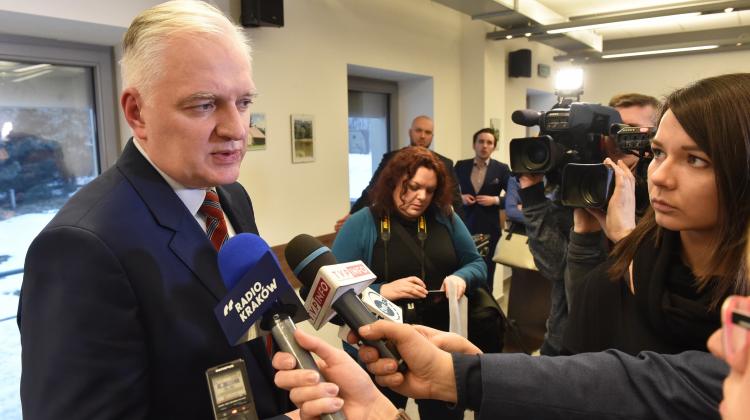Ministry of Science wants to change the rules for financing universities and science from 2017
 Photo: Fotolia
Photo: Fotolia
Ministry of Science wants the new provisions on the financing of higher education and science to be in force from 2017. Rules for granting funds to universities should be simplified, and quality and internationalisation - rewarded more - Deputy Minister of Science Teresa Czerwińska told PAP.
Special team that will work on changes in the system of financing higher education and science, began the work at the Ministry of Science and Higher Education on Friday. The experts will work on improve the efficiency of funding Polish universities and science, as well as simplifying the rules concerning the distribution of funds between institutions.
"We want to take a close look at the regulations concerning the financing of higher education and science and consider how to simplify them and cut through the red tape in order to more effectively achieve priority goals" - Deputy Minister of the Ministry of Science Teresa Czerwińska said in an interview with PAP.
Under the modifications regulations, internationalisation, and improving the quality of research and education will be rewarded more.
Ministry of Science wants the new rules concerning the financing of universities and science to enter in force from 1 January 2017. This you will require amendments to the Regulation (prepared in consultation with several other ministries) and legislative changes. By this September, the ministry wants to present a draft amendment to parliament.
Czerwińska added that the team set up at the ministry team will consider, among other things, how to simplify the algorithm on the distribution of statutory grants, according to which the funds are distributed between the universities.
Ministry of Science wants reward university links with the labour market. Universities would be rewarded, for example, for monitoring the careers of graduates and offering the best courses from the point of view of the labour market, such as those related to the so-called smart specializations. The second objective is the internationalisation of education - this primarily concerns attracting the best students from abroad. "Today, no country can build its future on internal resources. And we have a lot to offer" - said Czerwińska.
"We will also consider rewarding the universities that accept the best high school graduates, maintaining a demanding and adequate to the future course of study recruitment process, for example by introducing threshold requirements for candidates with regard to the number of points on the high school exit exam" - she said. She admitted that certain thresholds could also apply to II and III degree study candidates.
"We want to improve the quality of education and fight against the pursuit of the number of students and creating fictional recruitments; there are known cases where universities accepted candidates without high school exit exam in physics for a physics course. And one of the necessary conditions for ensuring a high level of education at universities is the recruitment of adequately prepared candidates, and not chasing the high numbers of freshmen, with an assumption of a comprehensive catch-up course. Despite good intentions on the part of universities, this often does not work and leads to lower level of education" - explained the deputy minister.
Czerwińska also addressed the PAP question whether in the new algorithm the money for universities will follow a student. In the academic community there are voices that in the era of population decline this leads to lower levels of study. "Teaching grant can not be completely independent from the number of students. It is irrational. We will continue to associate it with the number of students. We do not, however, want the number of students to be the driving force behind the functioning of universities. Chasing students can not be uncritical, without reflection" - commented the deputy minister.
Ministry of Science will also look at how the funds allocation algorithm can be used to motivate universities to more effectively spend the money - announced the deputy minister.
Resort wants the new algorithm to ensure a stable functioning of the universities, but also motivate them to action. The grant would depend to a greater extent on factors such as decisions taken by the university authorities, programs led by the university and the institution\'s position compared to other universities.
Czerwińska assured that before the ministry introduces changes concerning universities, it will conduct simulations on real data available at the ministry. "We would like the implementation of changes to be so simple that the data from the system POL-on would suffice" - she noted. POL-on is an integrated higher education information system, in which data on scientific institutions, universities and Polish science are collected.
PAP - Science and Scholarship in Poland, Ludwika Tomala
lt/ zan/ mrt/
tr. RL
Przed dodaniem komentarza prosimy o zapoznanie z Regulaminem forum serwisu Nauka w Polsce.


















